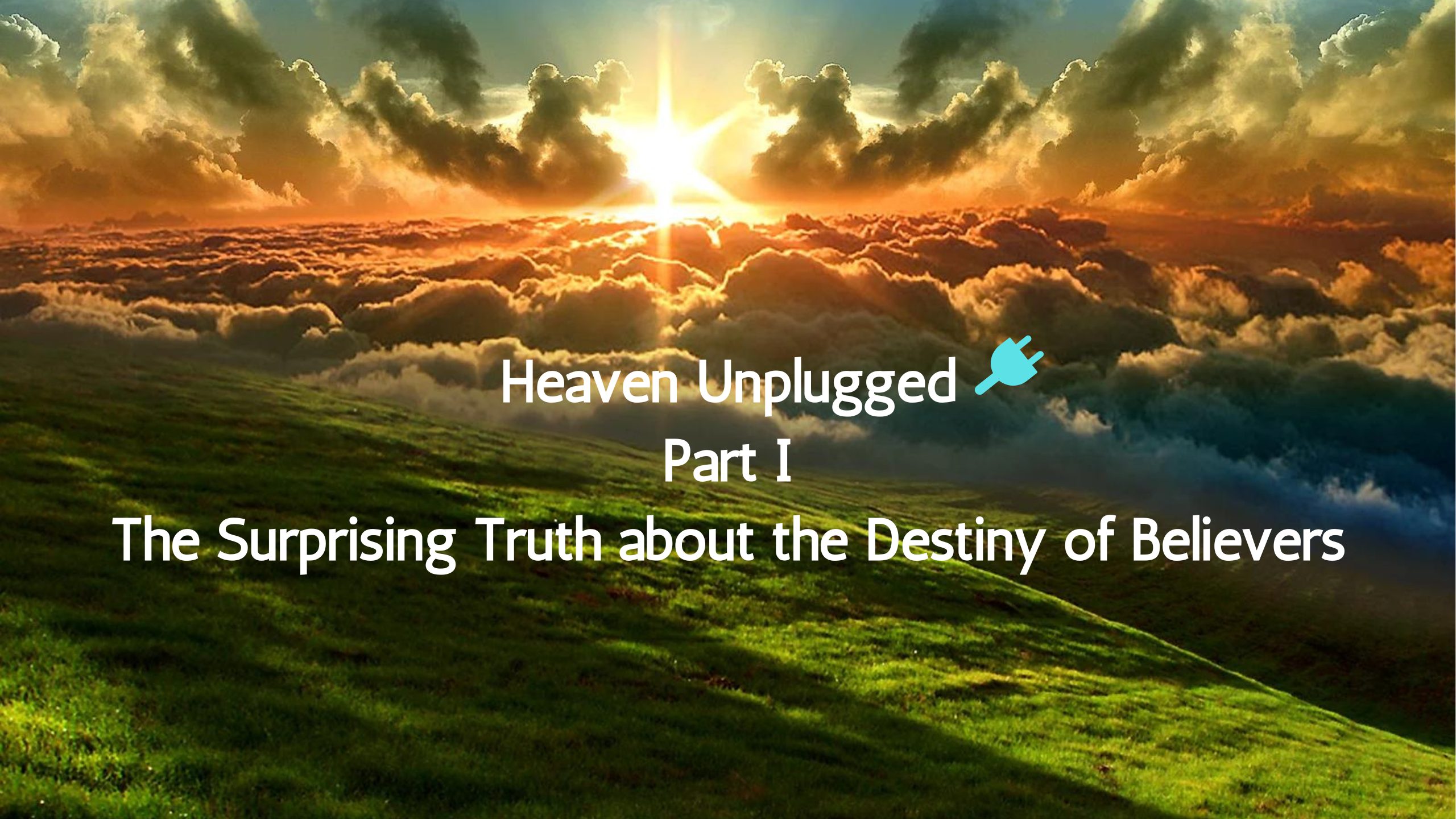Welcome to Sonday Life. It’s great to be back with you again. We’re continuing our series on Death, Resurrection, and Hell and now beginning a discussion about Heaven. We’ve seen from the previous topics that what the Bible teaches about these critical subjects is much different from what we’ve been taught. Heaven is much different also, as I present the Heaven of the Bible, unplugged from tradition, culture, fantasy, superstition, Systematic Theology, and dogma. The Bible is the only thing we’ll be plugged into for answers about heaven. And by only being plugged into the Bible, we’re going to find out the surprising truth about the destiny of believers. Is heaven where believers will spend eternity?
Our first surprise comes when we see in the Bible that the Jews had a much different concept of Heaven when compared to Christian theology. In Judaism, the term Heaven (Shamayim) typically refers to the dwelling place of God, the celestial realm where divine beings reside. It’s portrayed as a realm beyond the physical world, a place of transcendence and holiness. Being a place of holiness, then, humans can’t live there because God’s presence would atomize mortals. Why is this surprising? Because in the worldview of the Adamic, Noahic, and Abrahamic cultures, Heaven was God’s exclusive non-material realm. Heaven was God’s sacred space to the cultures to whom Genesis was delivered. To better understand what this means, we’ll look at what the first recipients understood about earth’s beginnings to know what they thought about heaven.
Let’s start with Genesis 1:1; “In the beginning, God created the heaven(s) and the earth.” Another surprise is that this verse isn’t about the creation of heaven and earth. This first verse is the introductory statement that God is the one who created heaven and earth. It isn’t saying “when” the beginning was. It also doesn’t explicitly describe heaven as the realm from which the universe was created; it sets the stage for understanding God’s role as the creator of all things. Again, the Bible was not written for us, but it is written for us. To understand what God has for us in the Word today, we must first understand how those who received it understood it.
Genesis 2:4 reaffirms that God created both the heavens and the earth, suggesting that Heaven existed before the creation of the physical world. While these verses don’t describe Heaven as the specific realm from which God created the universe, they lay the foundation for understanding God’s role as the creator and the distinction between the celestial and physical realms.
Those who first received this insight about the ordering of the creation also saw the heavenly realm as a created space with beings and various other creatures. They understood heaven and earth as being two very distinct realms. They also saw the garden as an intersecting space between the two realms. In Psalm 103:19-20 we see that God and his angels dwell in heaven. Heaven, God’s sacred space, was ordered and functioning according to God’s purpose. From heaven, God brought order to the earth (Genesis 1:2-3). God brought order to the chaos that was Earth in the beginning. These passages highlight the insight of Heaven as the dwelling place of God and divine beings, portraying it as a realm beyond the physical world and emphasizing its transcendent nature. The Spirit of God hovered over the chaos of the physical realm and brought order and functionality.
The Jews recognized the preeminence of Yahweh (the highest God) and understood that the garden was where God would visit and fellowship with his people. They saw the garden as God’s temple, his place of rest and communion with the physical realm. This is seen in God’s instructions to Moses for the Tabernacle in the wilderness as Israel wandered in the desert heading for the Promised Land. Once they were established and King David had secured peace from all the enemies of Israel, his son Solomon built a temple for God based on the Wilderness Tabernacle, which was based on the Garden of Eden. But, even in building the temple, the Jews knew God was more significant than heaven and earth, as signified by Solomon in 1 Kings 8:27. They knew that God was transcendent above everything. Even heaven itself can’t contain him.
In the Jewish worldview, heaven was God’s sacred realm, but it was not his ultimate resting place. Isaiah 66:1 shows that heaven was an unimaginable sacred space, but it wasn’t God’s ultimate place of rest.
So, what was the Jewish worldview of heaven four thousand years ago? Heaven was God’s sacred space where he had his throne and ruled over the heavenly and physical realms. Heaven wasn’t a place where the Jews thought they’d go in the afterlife. It wasn’t a space for humans; it was God’s space. They never expected in their wildest imaginations that they could occupy the same space as the Most High God. The closest thing to an afterlife for Judaism was Sheol. They saw Sheol as the realm of the dead or the grave, where all souls went regardless of their righteousness or wickedness. They had vague ideas about the possibility of rewards and punishments in the afterlife, but everyone would be in that same space away from God.
In Psalm 6:5, the psalmist says Sheol, was that a separate space (Ref, Job 14:13, Psalm 62:11-12). In Jewish thought, Sheol was the closest realm to something called heaven. It was the destiny for everyone. Why did they think this? Because all humanity, every culture at the time, recognized the transcendence, power, and distinction of God, or their gods, compared to humanity’s frailty, weakness, and impurity (Job 14:10-12).
The Old Testament view of the afterlife was, at best, depressing and, at its worst, completely hopeless. Why so depressing and hopeless? Because inside us, we know our sins (Ecclesiastes 7:20). This is the afterlife and heaven unplugged. Nothing artificial or added to what the Bible says by itself. In the next episode, we’ll see where the Bible gives mankind hope for an afterlife and whether that hope has anything to do with going to heaven.


